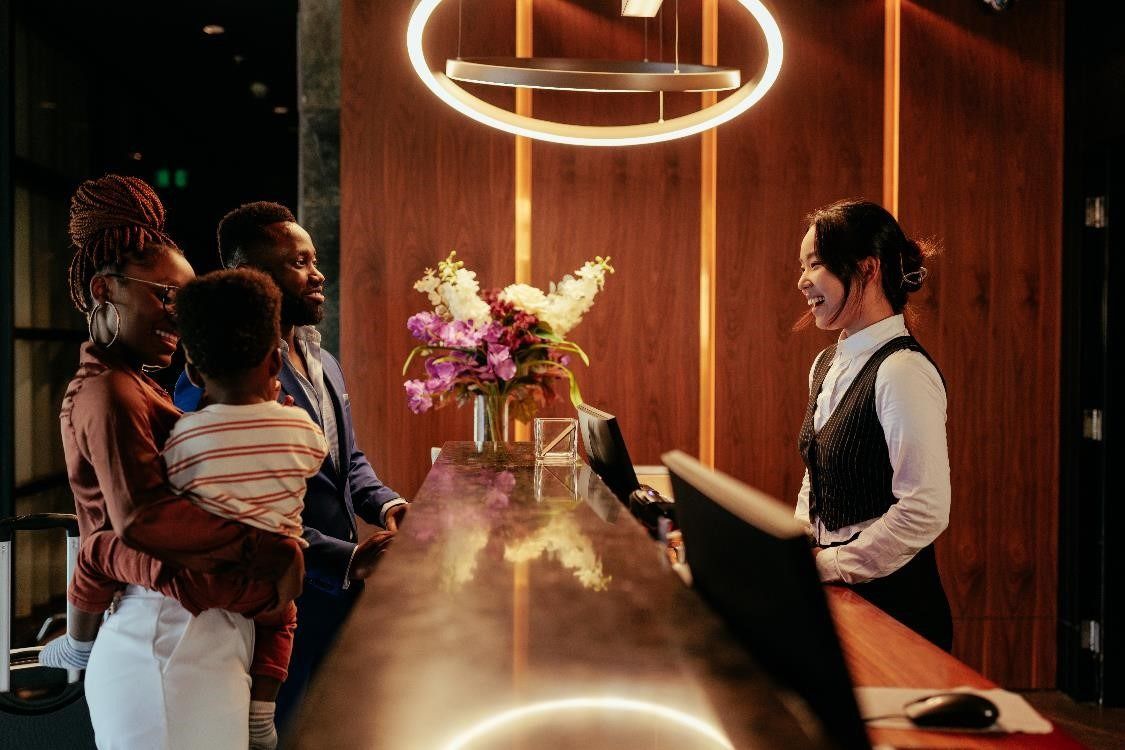Hotel Receptionist Job Description
Learn about the scope of a Hotel Receptionist role, from day-to-day responsibilities and work settings to longer-term career opportunities.

If you’re looking for a new, refreshing role in hospitality, conversing with guests and helping with bookings, then why not try a role as a Hotel Receptionist? These roles provide flexible working hours and are great for those who enjoy face-to-face interaction with a variety of people. Now, we will discuss the day-to-day aspects of a Hotel Receptionist role, and how to apply for these and similar roles.
What is a Hotel Receptionist?
A Hotel Receptionist works at the front desk of a hotel, taking bookings in person, over the phone, and using online apps or calendar software. They are the first port of call for guests checking in and must act as a customer service professional to deal with any inquiries or complaints from guests. You will need to relay information to other departments, such as housekeeping or maintenance, and keep track of bookings using computer software, often sending emails and other correspondence to guests.
Hotel Receptionists must kindly communicate with guests and give them all the necessary information they need about their stay. They also take payments and manage reservations. If you’re looking to develop your customer service skills and work in an environment with flexible work hours, this job is ideal. However, it is also commonplace to work unconventional hours such as evening or night shifts, and weekends. There are many opportunities to work in this environment, and this kind of hospitality role offers a good starting point for entry-level positions where you can gain new skills.
Becoming a Hotel Receptionist can pave the way into more roles within hospitality due to the skills you can acquire.

Similar Jobs to Hotel Receptionist
There are many jobs that have overlapping skills that fit well with a Hotel Receptionist role. This can include retail, customer support, and any customer-facing roles, such as front-of-house roles. These roles focus on communication, interpersonal skills, the ability to work under pressure, and dealing with disagreeable customers.
Other Jobs in Hospitality
Hospitality covers a wide range of roles with varying requirements and skills. You might work up to a Hotel Manager role by gaining experience and developing your skills as a receptionist, or branch into other roles such as housekeeping, bartending or events management, all of which will need varying levels of qualifications or experience.
Hospitality also encompasses the catering sector, ranging from Kitchen Porter to Head Chef, where you can learn many skills relating to cooking and food handling. Depending on what role you’re looking for, there are plenty of opportunities within the hospitality sector.
Apply for Hotel Receptionist Jobs Near You
Since Hospitality mostly relies on well-developed personal skills, if you have confidence in your communication skills, you can apply for many Hotel Receptionist positions. This is a good role for anyone looking for flexible shift patterns if they’re willing to work weekends and evenings.
Hotel Receptionist Job Description FAQ
Is a Hotel Receptionist a Good Career Choice?
A Hotel Receptionist role is a good choice for anyone looking to develop their customer service skills, but it can be demanding when dealing with difficult guests and irregular work hours.
What Skills Does a Hotel Receptionist Need?
There are a number of personal skills a Hotel Receptionist will need to succeed in this role, such as communication, customer service, adaptability, and IT skills, while speaking a foreign language is also a plus.
What Are the Biggest Challenges of Being a Hotel Receptionist?
This role can be demanding when dealing with customer complaints and hotel issues, which can affect guest satisfaction. It can often be the duty of a Hotel Receptionist to find solutions to more than one problem at once, and as such, it can become overwhelming.
What Personal Qualities Make a Great Hotel Receptionist?
An excellent Hotel Receptionist will have standout qualities in areas including interpersonal skills, active listening, conflict resolution, and organisation.



